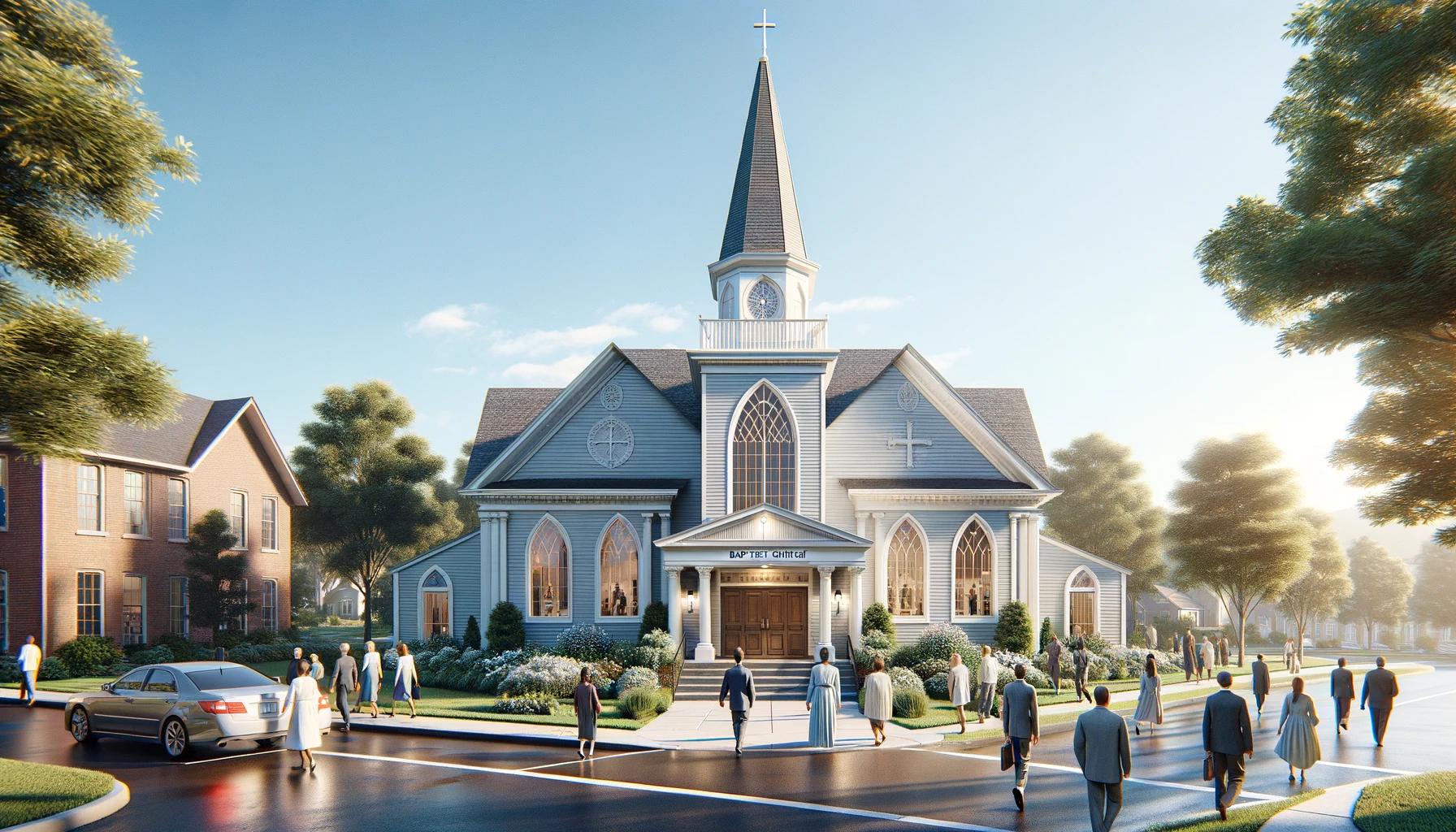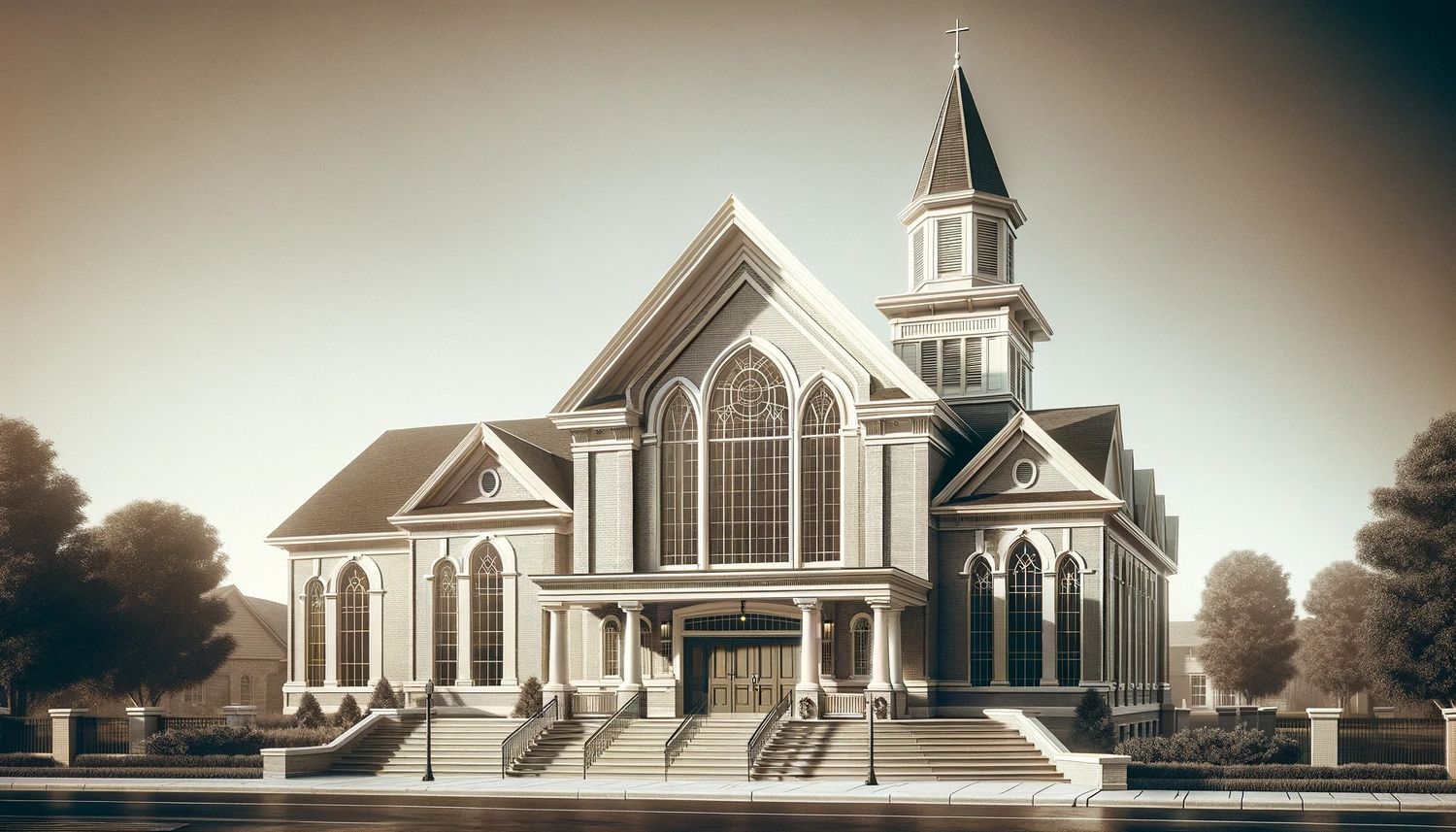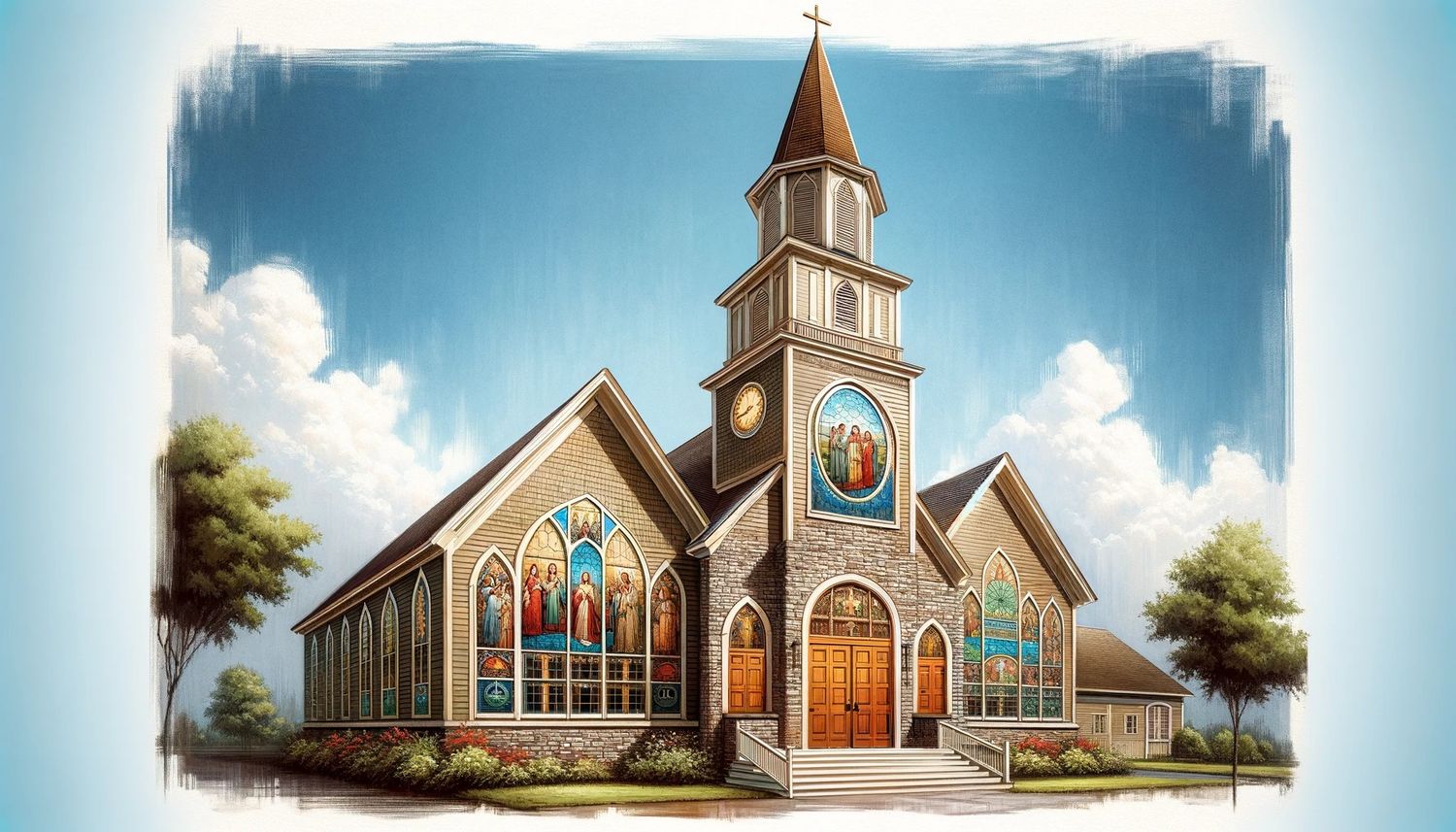Home>Theology and Spirituality>What Is The Role Of The Deacon In The Baptist Church


Theology and Spirituality
What Is The Role Of The Deacon In The Baptist Church
Published: February 23, 2024
Ericka Andersen, an editor at Christian.net, expertly merges digital strategy with content creation, focusing on faith and societal issues. Her communication skills enhance the platform's engaging narratives, fostering meaningful dialogue on belief's impact on society.
Discover the essential role of the deacon in the Baptist Church and their impact on theology and spirituality. Explore their duties and significance in the church community.
(Many of the links in this article redirect to a specific reviewed product. Your purchase of these products through affiliate links helps to generate commission for Christian.net, at no extra cost. Learn more)
Table of Contents
- Introduction
- Historical Background of the Deacon in the Baptist Church
- Qualifications and Selection Process for Deacons
- Responsibilities of Deacons in the Baptist Church
- Relationship Between Deacons and the Pastor
- Deacons' Role in Church Governance and Decision Making
- Deacons' Role in Pastoral Care and Support
- Conclusion
Introduction
The role of the deacon in the Baptist Church is a vital and esteemed position that holds significant historical and spiritual significance. Deacons play a crucial role in supporting the pastor, serving the congregation, and contributing to the overall well-being of the church community. Understanding the origins, qualifications, responsibilities, and relationships of deacons within the Baptist Church provides valuable insight into their essential role in the church's structure and function.
The position of deacon has deep roots in the early Christian church, with its origins traced back to the New Testament. The word "deacon" is derived from the Greek word "diakonos," which translates to "servant" or "minister." This etymological foundation underscores the fundamental nature of the deacon's role as one of service and ministry. Throughout history, deacons have been recognized as individuals called to serve and support the church in various capacities, reflecting the compassionate and servant-hearted nature of their responsibilities.
In the Baptist tradition, deacons are esteemed for their commitment to spiritual leadership, service, and stewardship. The selection and appointment of deacons are guided by specific qualifications and a thorough discernment process, ensuring that those chosen embody the virtues and character traits befitting their role. Once appointed, deacons assume diverse responsibilities that encompass both practical and spiritual dimensions, contributing to the holistic functioning of the church and the well-being of its members.
As we delve into the historical background, qualifications, selection process, responsibilities, and relationships of deacons within the Baptist Church, we gain a deeper appreciation for the significance of their role in the church's structure and mission. The multifaceted nature of the deacon's responsibilities reflects a commitment to service, compassion, and spiritual leadership, embodying the core values of the Baptist tradition. Through this exploration, we uncover the profound impact of deacons on the spiritual life of the church and the nurturing of its community.
Read more: In The Baptist Church What Is A Deacon
Historical Background of the Deacon in the Baptist Church
The historical roots of the deacon's role in the Baptist Church can be traced back to the early Christian church as depicted in the New Testament. The term "deacon" finds its origin in the Greek word "diakonos," meaning "servant" or "minister." This etymological foundation underscores the fundamental nature of the deacon's role as one of service and ministry.
In the New Testament, particularly in the book of Acts, the appointment of deacons is described as a response to the practical needs of the growing Christian community. Acts 6:1-6 recounts the selection and ordination of the first deacons, including Stephen and Philip, to oversee the distribution of food and aid to widows within the early church. This historical account highlights the integral role of deacons in addressing the practical and communal needs of the church, reflecting their early emphasis on service and care for the congregation.
Throughout centuries of Christian tradition, the role of deacons evolved, with distinct responsibilities emerging within different denominations. In the Baptist Church, the historical background of the deacon is characterized by a commitment to servant leadership, spiritual stewardship, and compassionate ministry. Deacons have been recognized as individuals called to serve and support the church community, embodying the values of humility, compassion, and selfless dedication.
The historical background of the deacon in the Baptist Church reflects a legacy of service, humility, and spiritual leadership. This historical foundation underscores the enduring significance of the deacon's role as a servant-minister within the Baptist tradition, shaping the ethos of compassionate care, practical support, and spiritual guidance within the church community. As the Baptist Church has evolved over time, the historical legacy of the deacon's role continues to inform and inspire their vital contributions to the church's mission and the well-being of its members.
Qualifications and Selection Process for Deacons
The qualifications and selection process for deacons in the Baptist Church are guided by specific criteria designed to identify individuals who exemplify the virtues and character traits befitting their role as servant-leaders within the church community. These qualifications are deeply rooted in biblical principles and are essential for ensuring that deacons fulfill their responsibilities with integrity, humility, and spiritual maturity.
Qualifications
The qualifications for deacons are outlined in the New Testament, particularly in 1 Timothy 3:8-13 and Acts 6:3. These passages provide a framework for the moral, spiritual, and relational attributes that deacons are expected to embody. Key qualifications include:
-
Character and Integrity: Deacons are called to be individuals of unquestionable character, demonstrating integrity, honesty, and moral uprightness in their personal and public lives.
-
Spiritual Maturity: Deacons are to be spiritually mature individuals, grounded in their faith and committed to ongoing spiritual growth and discipleship.
-
Family Life: The biblical qualifications emphasize the importance of a deacon's family life, requiring them to be faithful spouses and responsible parents, reflecting the values of love, respect, and harmony within their households.
-
Sound Judgment: Deacons are expected to exercise sound judgment, wisdom, and discernment in their interactions with others and in their decision-making processes.
-
Servant-Leadership: The heart of a deacon is one of service, humility, and sacrificial love, as they are called to model the servant-leadership exemplified by Jesus Christ.
Selection Process
The selection process for deacons is a deliberate and prayerful undertaking within the Baptist Church. It typically involves the following steps:
-
Nomination: Members of the congregation may nominate individuals whom they believe embody the qualifications of a deacon.
-
Evaluation: The church leadership, often in collaboration with existing deacons, evaluates the nominees based on the biblical qualifications and their commitment to the church's mission and values.
-
Training and Preparation: Those who meet the qualifications undergo a period of training and preparation, equipping them for the responsibilities of the deaconate.
-
Ordination: Upon completion of the evaluation and training, the selected individuals are ordained as deacons through a formal ceremony, affirming their commitment to serve the church and its members.
The qualifications and selection process for deacons in the Baptist Church reflect a commitment to upholding the biblical standards of servant-leadership and spiritual maturity. By adhering to these criteria, the church ensures that deacons are equipped to fulfill their vital role in serving the congregation, supporting the pastor, and contributing to the spiritual well-being of the church community.
Responsibilities of Deacons in the Baptist Church
The responsibilities of deacons in the Baptist Church encompass a diverse array of vital roles that contribute to the spiritual, practical, and communal well-being of the church community. Rooted in the principles of servant-leadership and compassionate ministry, these responsibilities reflect the integral role that deacons play in supporting the pastor, serving the congregation, and fostering a nurturing environment within the church.
-
Spiritual Support and Discipleship: Deacons are entrusted with providing spiritual support and guidance to church members. This includes offering pastoral care, praying with and for individuals in need, and facilitating opportunities for spiritual growth and discipleship within the congregation.
-
Assistance in Worship Services: Deacons often assist in the practical aspects of worship services, ensuring that the logistical and operational needs of the church are met. This may involve serving communion, collecting offerings, and assisting with the overall flow and organization of worship gatherings.
-
Community Outreach and Service: Deacons actively engage in community outreach and service initiatives, demonstrating Christ's love through acts of compassion and practical support for those in need. They may organize outreach events, coordinate charitable efforts, and mobilize the congregation to impact the local community positively.
-
Stewardship and Financial Oversight: Deacons play a crucial role in stewardship and financial oversight within the church. This involves managing financial resources, overseeing budgetary matters, and ensuring responsible and transparent financial practices that align with the church's mission and values.
-
Conflict Resolution and Reconciliation: Deacons are called to promote unity and harmony within the church community. They may be involved in facilitating conflict resolution, promoting reconciliation, and fostering a spirit of grace and understanding among church members.
-
Support for the Pastor and Church Leadership: Deacons provide essential support to the pastor and church leadership, standing alongside them in prayer, encouragement, and practical assistance. They serve as trusted confidants and collaborators, contributing to the overall health and effectiveness of the church's leadership team.
-
Caring for the Flock: Deacons demonstrate a deep commitment to caring for the flock, tending to the practical and emotional needs of church members. This may involve visiting the sick, comforting the grieving, and offering tangible support to individuals and families facing various challenges.
-
Prayer and Intercession: Deacons are dedicated to the ministry of prayer and intercession, lifting up the needs of the church and its members before the Lord. They play a vital role in cultivating a culture of prayer within the church, fostering spiritual vitality and dependence on God.
The responsibilities of deacons in the Baptist Church reflect a holistic commitment to serving, supporting, and nurturing the church community. Through their multifaceted roles, deacons embody the values of compassion, humility, and servant-leadership, enriching the spiritual life of the church and fostering a culture of care, unity, and faithfulness.
Relationship Between Deacons and the Pastor
The relationship between deacons and the pastor in the Baptist Church is characterized by collaboration, support, and mutual respect, reflecting a shared commitment to the spiritual well-being of the church community. This partnership is rooted in the biblical principles of servant-leadership and unity within the body of Christ, emphasizing the importance of working together to fulfill the church's mission and ministry.
Deacons and pastors often form a cohesive team, with each contributing their unique gifts and perspectives to the leadership and pastoral care of the church. The relationship is marked by a spirit of cooperation, where deacons come alongside the pastor to provide support, encouragement, and practical assistance in various aspects of ministry. This collaborative dynamic fosters a sense of unity and shared purpose, creating a strong foundation for the church's spiritual growth and outreach efforts.
In the context of pastoral support, deacons play a crucial role in upholding and assisting the pastor in their pastoral duties. They offer prayerful support, encouragement, and a listening ear, serving as trusted confidants and allies in the pastor's ministry. Additionally, deacons may assist in addressing the practical needs of the congregation, allowing the pastor to focus on preaching, teaching, and shepherding the flock with undivided attention.
Furthermore, the relationship between deacons and the pastor involves open communication and a spirit of humility and submission. Deacons respect the pastoral authority and leadership of the pastor, recognizing their God-given role in shepherding the church. At the same time, pastors value the input and insights of deacons, acknowledging their valuable contributions to the overall well-being of the church community.
This collaborative relationship extends to decision-making processes within the church, where deacons and the pastor work together to discern God's leading and make sound, informed decisions for the benefit of the congregation. Through prayer, dialogue, and a shared commitment to the church's mission, deacons and the pastor navigate challenges and opportunities, seeking to lead the church with wisdom, discernment, and unity.
Ultimately, the relationship between deacons and the pastor is characterized by a shared dedication to serving the church and nurturing its members. This partnership exemplifies the biblical principles of servant-leadership, mutual respect, and unity, creating a supportive and harmonious environment where the church can thrive and fulfill its calling to impact the world with the love and truth of Christ.
Deacons' Role in Church Governance and Decision Making
Deacons play a significant role in church governance and decision-making processes within the Baptist Church, contributing valuable insights, wisdom, and servant-hearted leadership to the overall functioning of the church. Their involvement in governance reflects a commitment to upholding the biblical principles of unity, wisdom, and discernment in guiding the church's direction and ministry.
One of the primary aspects of the deacons' role in church governance is their participation in leadership meetings and deliberations. Deacons bring a unique perspective to these discussions, drawing from their experiences in serving the congregation and their understanding of the church's needs. Their input often encompasses practical considerations, spiritual discernment, and a deep concern for the well-being of the church community.
Furthermore, deacons are entrusted with the responsibility of providing counsel and support to the pastor and church leadership in matters pertaining to the overall governance of the church. Their role involves offering wise and prayerful guidance, contributing to strategic planning, and ensuring that decisions align with the church's mission and values. This collaborative approach to governance fosters a sense of unity and shared ownership among the church leadership, promoting a cohesive and purposeful direction for the church.
In addition to their advisory role, deacons may also be involved in specific governance tasks, such as overseeing the implementation of church policies, reviewing financial matters, and addressing administrative considerations. Their involvement in these areas reflects a commitment to stewardship, accountability, and transparency, ensuring that the church operates with integrity and efficiency.
Crucially, the deacons' role in church governance is underpinned by a spirit of humility, servanthood, and submission to God's leading. While offering their perspectives and insights, deacons approach governance with a deep reverence for God's guidance and a commitment to seeking His will in all decisions. This spiritual posture enriches the governance process, infusing it with a sense of dependence on God and a desire to honor Him in all aspects of church leadership.
Overall, the deacons' role in church governance and decision making reflects a commitment to servant-leadership, wisdom, and spiritual discernment. Their contributions enrich the governance process, fostering a culture of unity, accountability, and faithful stewardship within the church. Through their involvement, deacons play a vital part in guiding the church's direction and ensuring that decisions are made with the well-being of the congregation and the advancement of God's kingdom in mind.
Deacons' Role in Pastoral Care and Support
Deacons play a pivotal role in providing pastoral care and support within the Baptist Church, embodying the compassionate and nurturing spirit of servant-leadership. Their involvement in pastoral care reflects a deep commitment to tending to the spiritual, emotional, and practical needs of the church community, fostering a culture of love, empathy, and genuine concern for the well-being of individuals.
One of the primary aspects of the deacons' role in pastoral care involves visiting the sick, the elderly, and those facing challenging circumstances. This ministry of presence and compassion allows deacons to offer comfort, prayer, and practical assistance to individuals in times of illness, distress, or isolation. By extending a caring and empathetic presence, deacons provide vital support to those in need, demonstrating Christ's love in tangible ways.
Additionally, deacons are actively involved in providing spiritual counsel and guidance to church members. They offer a listening ear, prayerful support, and wise insights, walking alongside individuals as they navigate various life challenges, spiritual questions, and personal struggles. This pastoral support encompasses a wide range of needs, including marital issues, grief, spiritual growth, and emotional well-being, reflecting the holistic care that deacons are committed to providing.
Furthermore, deacons play a crucial role in promoting a culture of unity, care, and mutual support within the church community. They foster a spirit of fellowship and encouragement, seeking to build meaningful connections and relationships among church members. Through their servant-hearted approach, deacons contribute to creating a nurturing and inclusive environment where individuals feel valued, supported, and spiritually nourished.
In times of celebration and joy, deacons also participate in rejoicing with those who experience significant milestones or achievements. Whether it involves congratulating new parents, celebrating anniversaries, or acknowledging personal accomplishments, deacons extend their support and encouragement, affirming the significance of these moments within the church family.
Overall, the deacons' role in pastoral care and support reflects a deep commitment to embodying Christ's love and compassion within the church community. Through their attentive and caring ministry, deacons contribute to the spiritual well-being, unity, and resilience of the congregation, fostering a culture of genuine care and support that enriches the church's communal life.
Conclusion
In conclusion, the role of deacons in the Baptist Church is deeply rooted in a rich historical legacy, guided by specific qualifications, and marked by a multifaceted array of responsibilities. From the early Christian church to the present day, deacons have exemplified the virtues of servant-leadership, compassion, and spiritual maturity, embodying the timeless principles of ministry and care for the church community.
The historical background of the deacon in the Baptist Church reflects a legacy of service, humility, and spiritual leadership. This historical foundation underscores the enduring significance of the deacon's role as a servant-minister within the Baptist tradition, shaping the ethos of compassionate care, practical support, and spiritual guidance within the church community.
The qualifications and selection process for deacons are designed to identify individuals who exemplify the virtues and character traits befitting their role as servant-leaders within the church community. By adhering to these criteria, the church ensures that deacons are equipped to fulfill their vital role in serving the congregation, supporting the pastor, and contributing to the spiritual well-being of the church community.
The responsibilities of deacons in the Baptist Church encompass a diverse array of vital roles that contribute to the spiritual, practical, and communal well-being of the church community. Rooted in the principles of servant-leadership and compassionate ministry, these responsibilities reflect the integral role that deacons play in supporting the pastor, serving the congregation, and fostering a nurturing environment within the church.
The relationship between deacons and the pastor in the Baptist Church is characterized by collaboration, support, and mutual respect, reflecting a shared commitment to the spiritual well-being of the church community. This partnership is rooted in the biblical principles of servant-leadership and unity within the body of Christ, emphasizing the importance of working together to fulfill the church's mission and ministry.
Deacons play a significant role in church governance and decision-making processes within the Baptist Church, contributing valuable insights, wisdom, and servant-hearted leadership to the overall functioning of the church. Their involvement in governance reflects a commitment to upholding the biblical principles of unity, wisdom, and discernment in guiding the church's direction and ministry.
In providing pastoral care and support, deacons embody the compassionate and nurturing spirit of servant-leadership, tending to the spiritual, emotional, and practical needs of the church community. Their involvement in pastoral care reflects a deep commitment to fostering a culture of love, empathy, and genuine concern for the well-being of individuals within the church.
In essence, the role of deacons in the Baptist Church is one of profound significance, encompassing a rich tapestry of historical, spiritual, and practical dimensions. Their commitment to servant-leadership, care for the congregation, and collaboration with the pastor exemplifies the enduring values of humility, compassion, and faithful stewardship within the church community. As they continue to embody these principles, deacons play an indispensable role in nurturing the spiritual vitality and communal well-being of the Baptist Church, enriching its mission and ministry for generations to come.













